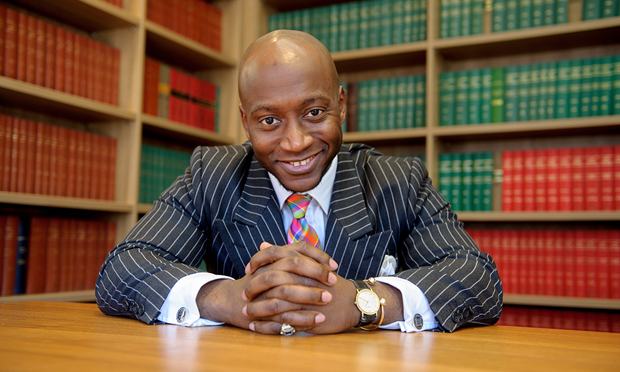Tunde Okewale MBE: from part-time jobs, and a 2:2, to the honours list

Tunde Okewale MBE.
The story of Tunde Okewale MBE is an unusual one. Okewale, 32, grew up on a council estate in Hackney, and became the first member of his family to attend university. Whilst studying Law at London Metropolitan University, Okewale was also holding down various part-time jobs in order to help support his household: his academic performance took a slump as a result of this, and he got a 2.2 in his degree. Suffice to say, these aren’t the typical fledgling steps for a high-ranking barrister on the 2016 honours list.
“I was working in Sainsbury’s in Dalston and decided I was going to ask every individual that I came across – whether it be a fellow employee or customer – if they knew anyone that could give me work experience,”said Okewale of his beginnings.
“Fortunately, there was a colleague in the meat and fish department who had a friend whose dad was a barrister. It was interesting because he came from a non-traditional background as well – he explained to me what the profession entailed, told me about the obstacles that he’d encountered, and he introduced me to his friends who gave me more work experience. The experience with him pretty much became the foundation for all the things that I went on to do.”
Knowing the importance of those initial steps is one of the reasons why Okewale has been so keen to give back to the community that fostered him, nurturing a new generation from “non-traditional” backgrounds. He is the founder of Urban Lawyers, an initiative that seeks to engage and better inform young people about the law, and is also a patron of the Hackney Community Law Centre.
“With any success there’s an obligation to give back. Urban Lawyers is something that I started when I first entered the profession, because people kept asking me, ‘Well how did you do it?’, or, ‘what are my legal rights?’. I wanted to make an organisation that could help people get into the profession but also to make the law more accessible from an information and educational point of view.
“A lot of people don’t understand their legal rights or the significance of the law – take a young man who’s 17 years old, he pinches a girl’s bottom and he ends up on the sex offenders list. That individual does not understand the significance of that happening – I think it’s very important that education addresses the issue.”
The biggest obstacles, in his mind, are not so much to do with where you went to school. “Ultimately I’d say the biggest issue is confidence. People from working class backgrounds have a confidence barrier – or, certainly I did. They don’t think certain opportunities are for them so they eliminate themselves.”
Okewale calls it a “soft bigotry” that stems from educational institutions even prior to university: “You can go to a Russell Group university, but you haven’t necessarily been to a secondary school that encourages you to change the world, so you’re not going to have those aspirations unless you have a good support base at home to push you forward. I think that needs to be the focal point that starts at a much younger age in schools – people are in university or in jobs based on the paradigms they created when they were younger.”
And is there any advice he’d want to give to young people trying to get into law right now?
His answer is a succinct but typically determined: “You can do it”.
In a profession dominated by Oxbridge graduates and people with the right connections, Okewale’s success is a testament to diligence in the face of adversity. There is still much to be done in the way of diversity and education in the field but – hopefully – stories like Okewale’s are about to get a lot less unusual.
This article was amended at 6.30pm on Tuesday 2 August 2016. The original article stated that Tunde Okewale attended the University of East London. In fact he completed his degree at London Metropolitan University.
